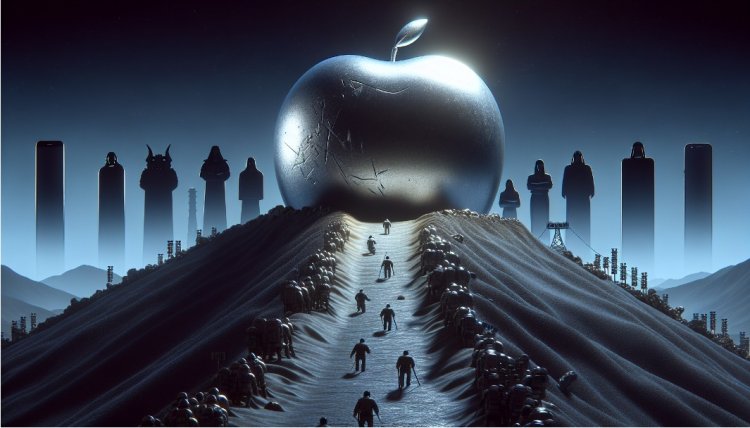Apple's Troubles: Losing the Top Spot and Facing Challenges Ahead
From tech giant to market challenger, Apple navigates a shifting landscape. Dive into the reasons behind its fall from the top spot, explore emerging challenges, and consider potential paths for reclaiming its throne.

Introduction
Apple, the once-dominant tech giant, is currently facing a series of struggles that are impacting its position as the most valuable company in the world. The company's recent woes have resulted in a significant decline in its stock value and a threat to its title. Several factors have contributed to Apple's current path, including declining iPhone sales and an impending patent dispute.
One of the key reasons for Apple's decline is the sluggish demand for iPhones, particularly in China and the United States. While the iPhone remains a top-selling device, overall demand has plateaued, causing concern for the company. Additionally, Apple's focus on hardware innovation rather than artificial intelligence (AI) has put it at a disadvantage compared to competitors like Microsoft, which is making significant strides in the AI space.
Amidst these challenges, the emergence of "The Magnificent 7" has further intensified the pressure on Apple. This group consists of America's top tech companies, including Apple, Alphabet, Microsoft, Amazon, Meta Platforms, Tesla, and Nvidia. Collectively, these companies drove the US stock market in 2023, with a combined value of $1.7 trillion. However, Apple's recent decline has resulted in a significant drop in the group's market cap.
Apple's position in the stock market is of utmost importance, not only for the company but also for investors and the overall market. Its route has already wiped out $177 billion in market value, and if the trend continues, Microsoft could soon overtake Apple as the world's most valuable company.
In the following sections, we will delve deeper into the specific factors contributing to Apple's struggles and explore the potential implications for the company and its stakeholders.
Challenges Faced by Apple
Apple, the once-dominant tech giant, is currently facing several challenges that threaten its position as the most valuable company in the world. These challenges have resulted in a significant decline in Apple's stock value and have the potential to impact the company's future success.
Rating downgrades leading to stock drops
Apple's recent troubles began with two rating downgrades in early 2023. These downgrades caused a significant drop in the company's shares, affecting investor confidence. The downgrades were a result of concerns over sluggish demand for iPhones and the lacklustre features expected in the iPhone 16. As a result, Apple's stock value took a hit, eroding its market capitalization.
Sluggish demand for iPhones
The overall demand for iPhones has plateaued, particularly in China and the United States. While the iPhone remains a top-selling device, the lack of significant innovation in recent models has contributed to the decline in demand. This stagnant demand poses a challenge for Apple, as it heavily relies on iPhone sales for revenue and profit.
Lacklustre iPhone 16 Features
The upcoming iPhone 16 is expected to have a lack of new features that would make it appealing to consumers. This anticipation of a less exciting product has further dampened investor confidence and has the potential to impact iPhone sales. Apple's competitors, such as Microsoft, are making significant strides in artificial intelligence (AI), putting Apple at a disadvantage in the market.
Impact of the Antitrust Case Investigation
Apple is currently under investigation for possible antitrust violations. The US Justice Department is looking into Apple's competitive practices and whether they hinder rivals' ability to compete. Key areas of investigation include Apple's services like iMessage and the payment system, as well as its Apple Watch. The outcome of this investigation could have far-reaching consequences for Apple's future operations.
Erosion of Market Value
As a result of these challenges, Apple's market value has experienced significant erosion. The company has lost $177 billion in market value, signalling a troubling trend for investors. If Apple's decline continues, Microsoft could soon overtake it as the world's most valuable company. This loss in market value not only impacts Apple's standing but also has broader implications for the overall stock market.
In conclusion, Apple is facing a series of challenges that threaten its position as the most valuable company in the world. Rating downgrades, sluggish demand for iPhones, lacklustre features in the iPhone 16, the antitrust case investigation, and erosion of market value are all contributing factors to Apple's current struggles. How the company navigates these challenges will determine its future success and impact the tech industry as a whole.
The Magnificent 7's Impact
The Magnificent 7, consisting of Apple, Alphabet, Microsoft, Amazon, Meta Platforms, Tesla, and Nvidia, have had a significant impact on the US stock market. Collectively, these tech giants drove the market in 2023, reaching a combined value of $1.7 trillion. However, Apple's recent struggles have caused a decline in the group's market cap.
Apple, once the most valuable company in the world, has faced challenges that have resulted in a decline in its stock value. The sluggish demand for iPhones, particularly in China and the United States, has contributed to Apple's decline. While the iPhone remains popular, the lack of significant innovation in recent models has caused demand to plateau.
Apple's decline has affected the combined value of the Magnificent 7. The group's market cap has dropped due to Apple's struggles, eroding investor confidence. This decline in market value is of great importance, not only for Apple but also for the overall stock market.
One specific incident that affected Apple's market cap was a report suggesting that the US could file an antitrust case against the company. This raised concerns about Apple's competitive practices, including its services such as iMessage, payment system, and Apple Watch. The outcome of this investigation could have far-reaching consequences for Apple's future operations.
Furthermore, Apple's decline in market value has opened the door for Microsoft to potentially overtake it as the world's most valuable company. The gap between their market caps is relatively small, and if Apple's decline continues, Microsoft could soon claim the top spot.
In conclusion, The Magnificent 7, including Apple, have had a significant impact on the US stock market. However, Apple's recent struggles, including sluggish iPhone sales and the threat of an antitrust case, have caused a decline in the group's market cap. The outcome of these challenges will determine Apple's future success and its position in the tech industry.
Reasons Behind Apple's Bad Route
Apple's recent struggles can be attributed to several key factors that have contributed to its decline as the most valuable company in the world.
Barclays Downgrade and Reasons Behind It
Barclays downgraded Apple's stock, citing two main reasons. First, there is sluggish demand for iPhones, particularly in China and the United States. While the iPhone remains a top-selling device, overall demand has plateaued, causing concern for the company. Second, Barclays predicts that the upcoming iPhone 16 will lack new features that would make it appealing to consumers. This anticipation of a less exciting product has further dampened investor confidence and has the potential to impact iPhone sales.
Piper Sandler's additional downgrade
Piper Sandler's downgrade of Apple's stock added to the company's woes. This additional downgrade caused shares to slide even further, eroding investor confidence. The multiple downgrades have raised concerns about the company's future performance and market value.
Antitrust Case Investigation Details
Apple is currently under investigation by the US Justice Department for possible antitrust violations. The investigation is focused on Apple's competitive practices and whether they hinder rivals' ability to compete. Specific areas of scrutiny include Apple's services like iMessage and the payment system, as well as its Apple Watch. The outcome of this investigation could have far-reaching consequences for Apple's future operations.
Focus on Apple's Competitive Practices
The antitrust case investigation highlights concerns about Apple's competitive practices. The investigation aims to determine whether Apple's actions make it harder for its rivals to compete in the market. The scrutiny of Apple's services and products could potentially lead to changes in the company's business practices and affect its future growth.
Impact on Apple's Market Cap
As a result of these challenges, Apple's market cap has experienced a significant decline. The company has lost $177 billion in market value, signalling a troubling trend for investors. If Apple's decline continues, Microsoft could soon overtake it as the world's most valuable company. This loss in market value not only impacts Apple's standing but also has broader implications for the overall stock market.
In conclusion, the combination of Barclays and Piper Sandler's downgrades, the antitrust case investigation, and the erosion of Apple's market value are the key reasons behind the company's bad route. These factors highlight the challenges Apple is facing and the potential impact on its future growth and competitiveness in the tech industry.
Sluggish demand and market challenges
Apple is currently facing challenges in the market, including sluggish demand and market challenges. These factors have the potential to impact the company's growth and future success.
Slowing demand in China and the US
One of the key reasons for Apple's decline is the sluggish demand for iPhones, particularly in China and the United States. While the iPhone remains a top-selling device, overall demand has plateaued, causing concern for the company. This decline in demand poses a challenge for Apple, as it heavily relies on iPhone sales for revenue and profit.
Plateauing Smartphone Market
The smartphone market, in general, is plateauing, which further contributes to Apple's challenges. Even though the iPhone remains popular, the lack of significant innovation in recent models has caused demand to level off. This stagnant demand poses a challenge for Apple, as it needs to find new ways to attract customers and boost sales.
Apple's Heavy Reliance on iPhone Sales
Apple's heavy reliance on iPhone sales for its revenue and profit puts the company in a vulnerable position. The decline in demand for iPhones directly affects Apple's financial performance. To overcome this challenge, Apple needs to diversify its product portfolio and explore new revenue streams beyond the iPhone.
Growth of Apple's Services
While Apple faces challenges in the hardware market, the company has seen growth in its services, such as Apple Music and Apple Pay. These services have been steadily growing, but they have not been able to offset the decline in iPhone sales. To maintain growth and profitability, Apple needs to further capitalise on its services and expand its offerings in the digital services market.
Microsoft's Advantage in Artificial Intelligence
Another challenge for Apple is Microsoft's advantage in the field of artificial intelligence (AI). Microsoft has been making significant strides in AI, while Apple has been lagging behind. This puts Apple at a disadvantage in terms of innovation and competitiveness. To stay relevant in the tech industry, Apple needs to invest more in AI research and development to catch up with its competitors.
In conclusion, Apple is currently facing challenges in the market, including sluggish demand and market challenges. The slowing demand in China and the US, the plateauing smartphone market, Apple's heavy reliance on iPhone sales, the growth of Apple's services, and Microsoft's advantage in artificial intelligence are all factors that contribute to Apple's current struggles. To overcome these challenges, Apple needs to diversify its product portfolio, capitalise on its services, and invest in AI research and development.
Apple's AI Challenges
While Apple has been the dominant tech giant for years, it is facing challenges in the AI space that are impacting its overall position in the market. One of the key challenges Apple faces is Microsoft's focus on AI. Microsoft has been making significant strides in the field of artificial intelligence, while Apple has been lagging behind.
Apple's attempts to catch up in the AI space have been slow and have not been able to match the progress made by Microsoft. The company has introduced certain products, like the Vision Pro virtual reality headset, which is set to be released this year. However, it has yet to make a significant impact in the AI market.
Another area where Apple has potential is in the development of generative AI software. This type of software has the ability to create new and original content, which can be valuable in various industries. However, Apple has not made any concrete advancements in this area, and its competitors may surpass it in the race for generative AI software.
Apple's lag in the AI space has several implications for the company. Firstly, it puts Apple at a disadvantage compared to competitors like Microsoft, who are already reaping the benefits of AI technology. This can impact Apple's innovation and competitiveness in the market.
Furthermore, AI has become an integral part of various industries, including healthcare, finance, and transportation. By falling behind in this field, Apple may miss out on potential opportunities in these industries and lose market share to competitors who have embraced AI technology.
In conclusion, Apple's challenges in the AI space are significant and have implications for the company's future success. Microsoft's focus on AI, Apple's attempts to catch up, the introduction of the Vision Pro virtual reality headset, the potential of generative AI software, and the implications of Apple's lag in the AI space are all factors that Apple needs to address to maintain its position as a leading tech giant.
Apple's Tough Year Ahead
Apple is facing a combination of challenges that could make the year ahead difficult for the once-dominant tech giant. These challenges have the potential to impact Apple's position as the most valuable company in the world, which it has held for several years.
Historical Significance of Innovation for Apple
Innovation has been a driving force for Apple's success throughout its history. The company revolutionised industries with products like the iPod, iPhone, and iPad, setting new standards for consumer electronics. However, in recent years, Apple has struggled to maintain the same level of innovation, particularly in the AI space.
Potential Consequences of a Lack of Innovation
The lack of significant innovation in Apple's products, especially the upcoming iPhone 16, could have consequences for the company's future. Consumer demand for iPhones has plateaued, and the lacklustre features of the iPhone 16 may further dampen sales. This could result in a decline in market value and potentially lead to Microsoft overtaking Apple as the world's most valuable company.
Uncertain Future for Apple
Apple's current challenges and uncertain future pose significant risks for the company. The combination of rating downgrades, sluggish demand for iPhones, an impending patent dispute, and the threat of an antitrust case investigation all contribute to the uncertainty surrounding Apple's future. How the company addresses these challenges will determine its success and standing in the tech industry.
Conclusion on Apple's Current Situation
Apple is currently navigating a tough year, with a combination of challenges impacting its position as the most valuable company in the world. The sluggish demand for iPhones, lack of innovation, antitrust case investigation, and erosion of market value all contribute to Apple's current struggles. The company's ability to address these challenges and adapt to the changing landscape will determine its future success and competitiveness in the tech industry.



 admin
admin 










